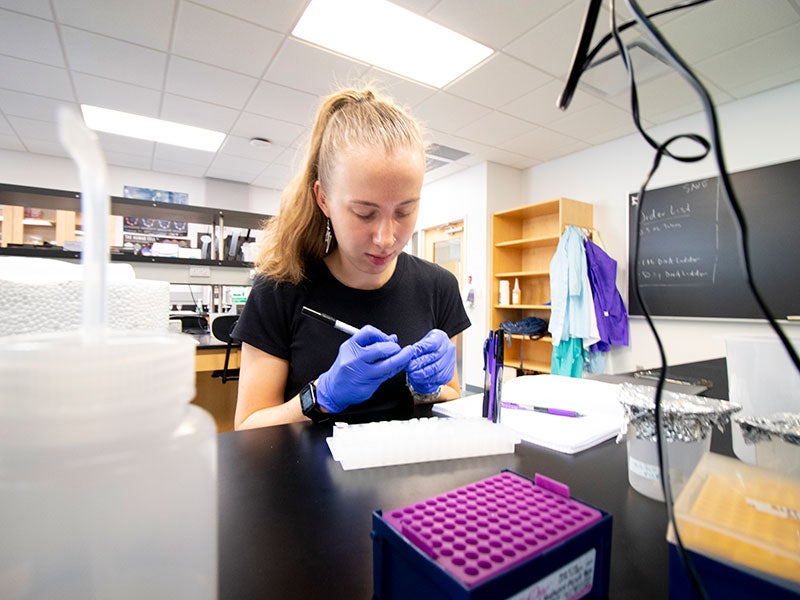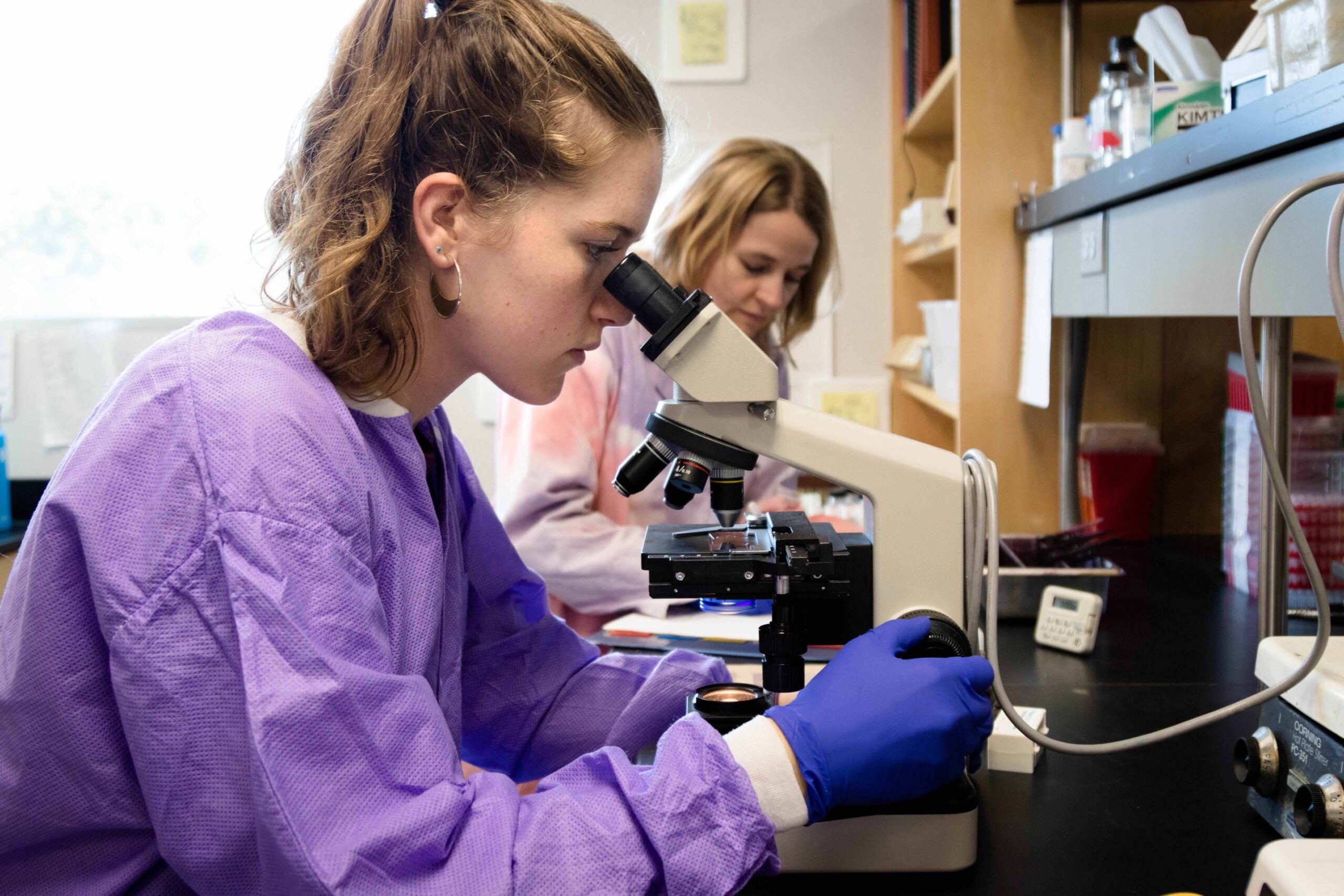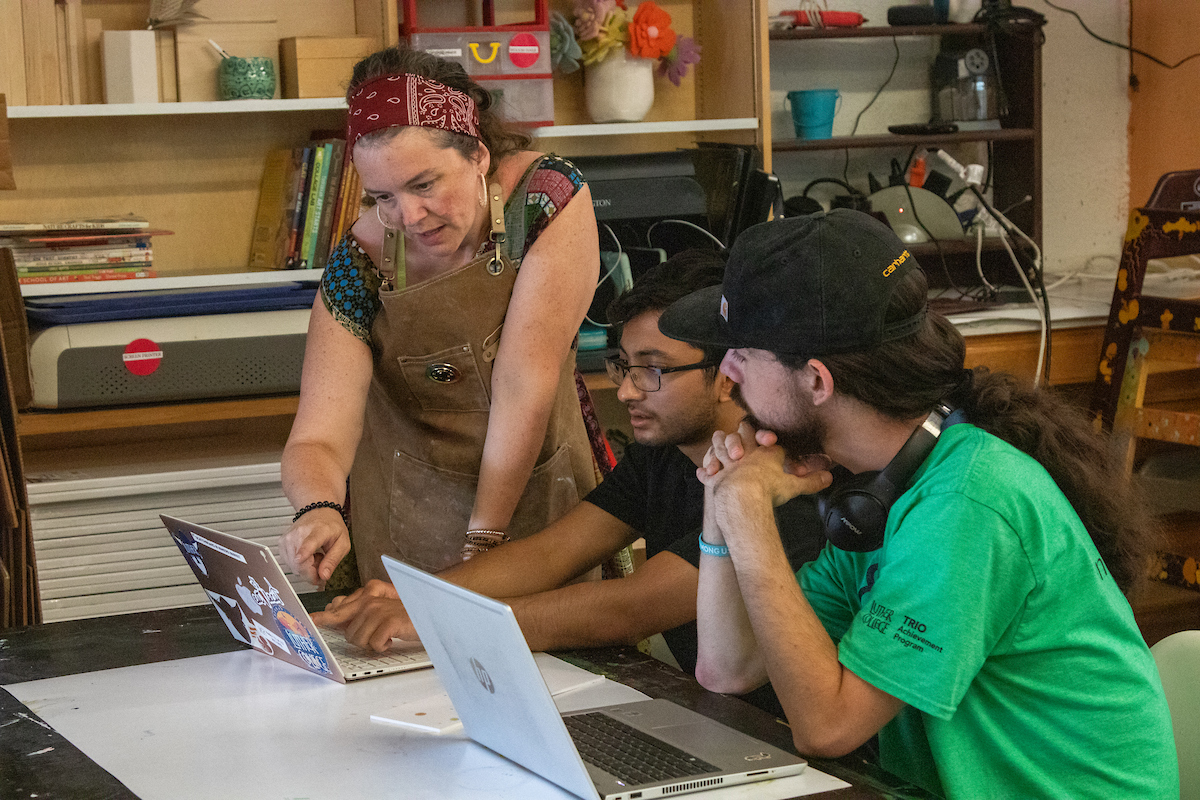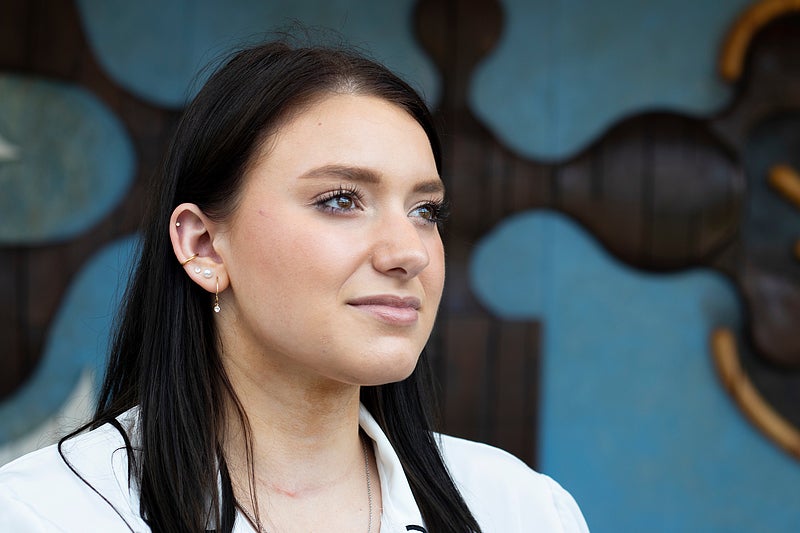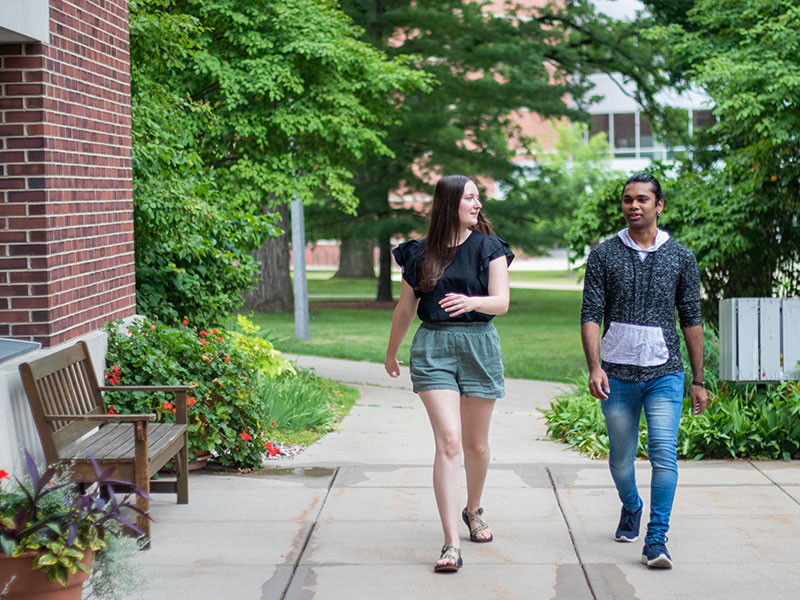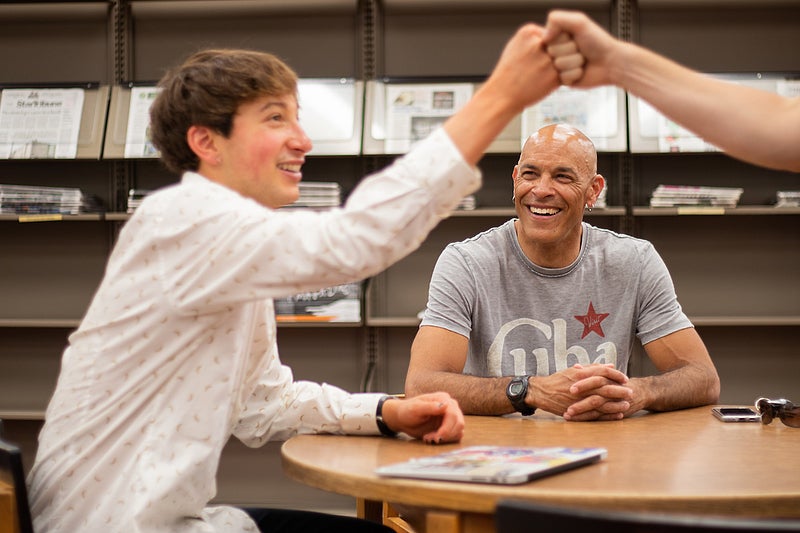Undergraduate Research
Luther students often collaborate with faculty on research projects, addressing challenging questions that go beyond what's learned in semester-long courses.
I’ve learned how to work in a team, design my own project, and address the problem when things don’t go exactly how we want it. Being able to go with the flow and change things as the challenges arise are good skills to know.
Jill Richards '22
Take a Peek into Luther's Labs
Recent Research Includes Many Fields
About the Project
The Conceptual Competencies Curriculum research project seeks to develop a curriculum framework that will change the direction of our current education system. Through this research project, elementary education major Megan Priest ’23 will establish a better understanding of the areas where our current education system needs improvements.
“Our education system was designed during the Industrial Revolution to emulate an assembly line for factories. Inserting bells, having kids raise their hands, and grouping subjects together, was all created for people to know how to work in a factory. It was expected that when they graduate from high school, they would automatically understand how to work in a factory, and it would make that transition a lot easier,” explains Priest.
“This is still going on today even though it is not the type of society we live in anymore. Our communities have evolved so much. We are not industrial. We are much more technologically advanced,” says Priest.
The idea that the education system has not transitioned to more contemporary practices motivated Priest to develop a Conceptual Competencies Curriculum. “Essentially right now we are creating a generation of kids to be workers. Instead, I think we should focus more on building a fully functional person with self-regulatory skills and the ability to understand their identity and then contributing that into our environment and surroundings,” explains Priest.
Moving Forward: Pillars for a Better Education
In collaboration with faculty advisor Jodi Meyer-Mork, associate professor of education, Priest came up with four pillars that will differentiate the conceptual competencies curriculum from our current educational system.
The four pillars include: developmentally appropriate practices, relationship-building programs, project and play-based learning, and social-emotional learning.
“These pillars are important for nurturing oneself and then building who they are, their identity, and then being able to share that within their community. These are all great strategies that normally aren’t provided until you grow up, go to college, or move on to a career. Instead, they should be provided at an earlier life stage. By having all of these concepts implemented at such a young age, you’re able to start grasping them and building your academics upon it.” says Priest.
“These pillars for learning encourage students to take initiative. They’re aware that they can investigate and don’t always need an adult to direct them and their education. It’s essential that students know how to learn on their own, be passionate, and develop their interests and it can also encompass what’s being taught in school,” adds Meyer-Mork.
Learning Outcomes
Before starting this research project, Priest had different plans for her future. The opportunity to research an area she’s passionate about has helped her to find a sense of vocation.
“Conducting this research has encouraged me to go into curriculum development and instruction. I’ve decided that I’m going to go to graduate school and continue researching this because I am passionate about it,” says Priest.
Moving forward into her remaining years of education at Luther, Priest will continue to work on developing this new curriculum framework with a narrower focus.
“Within the next couple of years at Luther, I’ve decided that my research would be more effective if I narrow my focus on one age range, either early childhood or high school, so I could get an in-depth understanding of what a curriculum would consist of at that point of education.”
About the Project
Biology major Annalise Meyer ’23 and environmental studies major Jill Richards ’22, along with Professor Beth Lynch, have worked to catalogue plant species on two specific algific talus slopes in the Driftless Area. The slopes are small and fragile ecosystems on top of underground ice deposits. Cold air vents make the slopes much cooler than the surrounding forest. Some plant species are at their southern range limits on algific slopes, with most of their populations living much farther north.
“Many of these species are glacial relics, meaning they are species that we think were growing here from the last ice age and this was a place they could hang out that was cold but not ice-covered. The thought is that they have been here ever since the ice left and so as the climate warms farther and farther, they’re getting pushed closer to their tolerance limits. So my question is, as the climate warms, are these species going to be able to continue living here or not?” says Professor Lynch.
The study is being conducted in two units of Driftless Area National Wildlife Refuge (DANWR), located in Northeast Iowa and managed by US Fish and Wildlife Service.
Richards, Meyer, and Lynch want to collect baseline data on the slopes against which future changes in microclimate and vegetation can be measured.
“There are plants that can only grow on the slopes or plants that are at their southern limit of their distributions. If we are able to identify plants that live in these cooler regions, and need that climate, we could potentially identify plants that require protection from global warming and what’s going to happen with these plants as the climate slowly gets warmer and warmer. There isn’t baseline data on algific slopes and what the temperature is right now. We will be able to compare it to future data to see what plants are growing here with global warming and what the temperatures are so we can see what species are in most need of help,” says Meyer.
Data Collection in the Field
The research group uses the point-intercept method to quantify the vegetation on the algific slopes.
“The sampling technique involves running a long tape measure along the ground and then at every meter we drop a pin down to the ground. We record every single plant species that the pin hits on the way down. Is it a rock? Is it moss? Is it dead leaves? We are dropping a pin along these transects to collect information about the vegetation,” says Lynch.
The researchers collected temperature and soil moisture data by hand 3x during the summer, and installed data loggers at one of the sites to collect hourly soil temperatures (no moisture) from June until October.
“Nobody has ever collected baseline data at the places we’re looking at! There’s not been a species list made especially for a lot of these plants. Working with the species that are endangered and in peril is hard. I get kind of emotional because there’s no real tangible way to just scoop them up and save them,” says Richards.
“When you first go out into the woods you just think all the plants are the same, they’re all green and they’re all this high. But then once you take a closer look you can see all the differences and really appreciate the biodiversity that’s present in the places that we are studying” says Richards.
Sharing the Results
The research results will be shared with the US Fish and Wildlife Service and seventh graders at Decorah Middle School. “The US Fish and Wildlife Service owns the property that we have been working on, and these are data that they are really eager to have for their management planning of these sites. We are sharing the data and information about the project with the seventh grade science teacher at the Decorah Middle School and so that she can use the data to help teach her students about algific talus slopes and also give them real data that they can practice graphing and analyzing.”
Hands-On Experience
Richards and Meyer believe the project has helped them learn about problem solving and what a career in research consists of.
“I feel like I’ve learned how to work in a team, design my own project, and address the problem when things don’t go exactly how we want it. Being able to go with the flow and change things as the challenges arise are good skills to know,” says Richards.
“I’ve learned a lot about the biology of plants and how research works so it’s helped me in my decision process for what kind of career I’m going to go into. It’s also provided me with a hands-on experience which I appreciate,” says Meyer.
Lynch teaches classes in botany, ecology, and an introductory biology course (Ecology, Evolution, and Biodiversity) and feels that research projects benefit students because they involve real challenges and experience.
“When I was a biology student the real learning and career preparation happened in places like this where you are in the field, are faced with real research problems, and you’ve got to solve them. These students are getting to spend eight weeks this summer doing what I call real research. The data we are collecting are going to be published someday and to be able to participate in that is going to teach them so much about what being a biologist is,” said Lynch.
About the Project
The Social Impact Fellowship project pairs a student majoring in business and a student majoring in social work to work with a local non-profit or service organization to help them solve a problem or address a need in the larger Decorah community.
“This year we are working with CHOICE employment services in Decorah, an organization that works with adults with intellectual disabilities to help them with different employment opportunities and services such as employment counseling” explained Rachel Clennon ’22, a social work and political science major.
“Our goal is to establish a Special Olympics event or chapter in the Decorah community or at Luther College.” Clennon believes that the importance of this project is to educate the greater Decorah community about intellectual disabilities, and make sure that they are heard, understood, involved, and included in all aspects of the community.
At the beginning of the research, the students developed a survey to assess the community’s interest in a Special Olympics event in Decorah. “The results showed that a lot of people would be interested in attending and participating in such an event. 86% of people are interested in participating, 93% of people are interested in attending that event, and our top sports were bowling, basketball and track and field,” said Clennon.
Accounting major Sebastine Swamynathan ’22 and Clennon explained that the next step is to be accredited by Special Olympics Iowa as a Special Olympics college. “This could then open the door to a Special Olympics and Division III NCAA College Partnership” added Clennon.
The students will continue to work towards their goal of creating a Special Olympics event throughout the year. “We are hoping to create a Special Olympics College Club in the fall and work on official events within the school year, starting with the Norse Unity Bowl” said Swamynathan.
Benefits of Collaborative Learning
Faculty advisor Brittany Cord, associate professor of accounting and management, explained that cross-department collaboration is the “cornerstone” of this research project. “The idea that you are not only getting service-learning and hands-on learning experience in the community but that you’re doing it with someone outside of your discipline, and in an area that you don’t necessarily know a lot about,” added Cord.
Britt Rhodes, professor of social work, explained that before they started the Social Impact Fellowship, the faculty advisors for the project developed a framework that clarified the objectives, and then used professional connections to reach out to organizations and asked them to submit a project proposal.
The project not only involves students from different majors but has also provided the opportunity to work with Luther College alumni.
This year the project involved Leah Dahlquist ’15, who is the regional director of CHOICE employment services. According to Dahlquist, this opportunity has allowed her to come full circle, from being a student to becoming an alumni mentor and giving back to Luther by collaborating with students and professors throughout this process.
“One of the things that is great about Luther is how much our alumni give back to our students. This project is a great example of engaging the next generation of Luther alumni,” mentioned Alexandra White, associate professor of management.
From the students’ perspective, the interdisciplinary aspect of the project has provided them a richer experience and has not only impacted the project outcomes but their personal development.
“Working with someone from another discipline has been really fun and it brings to mind different aspects of a project that you would not usually think of if you are working by yourself. I have learned a lot from working with Rachel on policies, compliances, and regulations which are some things that I would not really look into in my own time,” explained Swamynathan.
Connecting to the Community
The Social Impact Fellowship project is driven by Luther’s mission “to serve with distinction for the common good.”
“Campus community partnerships are really important to Luther,” explains Rhodes. “This project helps students see the difference between being in a community and genuinely being part of a community, being able to learn about a community, learn about an organization, and making a meaningful difference in the place where they call home for four years.”
“At Luther you can build strong relationships with people. Seeing Leah Dahlquist, ‘15 and Patrick Larson, ‘17 talk about their experiences at Luther and share how passionate they are about giving back to the college, you get a sense of the close campus connections and the larger Decorah community and with this project I am also able to give back,” added Swamynathan.
About the Project
Neuroscience major Anneke Knauss ’22 and biology/data science major Julia Schulte ’23 worked together on research investigating how stressful environments influence the expression of genes in the species of worms called C. elegans. They used heat shock as a stressor on groups of worms, and compared them against an average non-stressed group. “We tested two different types of genes and tested four different types of complementary DNA,” Schulte says. “We made the cDNA ourselves, and tested the expression of the different cDNA against a normal population of worms by using heat shock. We then harvested the worms to see if their genes were different from those that were not under that stress.”
Biology major Hamid Ahmed’s investigation focused on the expression of the zmp-6 protein. In his experiment, he reduced the expression of the zmp-6 protein, and using a microscope, Ahmed ’22 compared the development of zmp-6 worms with a control group. “I focused on studying how the zmp-6 protein works, where it was being expressed, how it was expressed, was there any connection between different life stages of this worm and the expression rate of this protein,” Ahmed says. “The protein I studied essentially takes care of other proteins—it’s like the ‘retirement center’ for old proteins. Because proteins need to be turned over every now and then, if this protein does not do its job, old proteins can start messing stuff up in the cell. You can connect this to Alzheimers, to cancer research, or other ‘big picture’ diseases that result from dysregulation.”
Determining the Path Forward
“None of the actual methods or processes that we went through were all too challenging, but it was mostly just the repetition that was difficult,” Knauss says. “When things weren’t working, we had to just keep going, hoping that our results would get better and that we would get more efficient at going through the motions of the lab work. Sometimes the process did get a little repetitive, but the data we got from everything helped keep the process interesting and engaging.”
Not only was the process of experimenting at times repetitive, but occasionally the results they got were discouraging. Schulte adds that “The most challenging part for me was getting used to getting bad results. When you’re in a class setting, everything is already set up, it’s been done before, and you know what the results are going to be—you’re just trying to get it. But when you’re in the research setting, it’s different. Not everything is all laid out for you and you might not get what you’re expecting to see. Just dealing with bad results constantly and working towards getting better results was hard at first, but it makes the research more rewarding.”
Part of conducting research is being responsible for results, and for Ahmed, he had to determine the path forward for his research himself—which he found to be the most challenging part of the process. “I went through a lot of stages, and every stage had its own challenge,” Ahmed says. “I was at a point in my research where I had a lot of raw data, but I had to analyze it all. It’s not a paved path, and there’s no one way to do it––you kind of figure out what you’re going to do as you do it. I also had a bunch of images and had to figure out how I could turn those images into numbers. Maybe that sounds easy, but when you do that practically, it becomes really tough because there’s no borderline—you make up the rules as you go, and things become pretty difficult.”
Advice for Students Contemplating Research
Though summer research may seem daunting, it can be a very rewarding experience. For students considering summer research, Schulte suggests pursuing the opportunity, even if you aren’t 100% certain it’s what you want to do as a career.
“If you are considering research, I highly advise getting some kind of summer experience like this,” Schulte says. “It really opens your eyes to what it’s actually like, and shows you what a day-to-day would be like in an actual lab. Talk to professors, talk to your friends, talk to anybody, just get in. Get in the lab, try it out, and see if you like it.”
Ahmed adds that practical experience will only strengthen your understanding of the concepts you learn in the classroom. “I think when you apply your knowledge, you learn more about what you thought you already know a lot about,” said Ahmed. “You learn a lot more in a different depth as well by practicing and applying what you’ve learned in the classroom. We all know the basics of how cells work and all that, but when you come and apply your knowledge and analyze the results, it’s a different way of learning.”
For students not sure how to get started doing summer research, Knauss suggests letting a professor know you are interested, rather than waiting for the opportunity to just arise. “Talking to your professors is a really good thing to do,” said Knauss. “If you’re taking classes that you have labs in, the professors are probably engaging in some kind of research at one point or another, or they know other people who are actively doing that. I would suggest reaching out because expressing interest explicitly goes a long way, and also, professors want to help you out. They want students who are interested, curious, and willing to learn.”
Sharing with the Luther Community and Beyond
Brian Hiester, associate professor of biology, and his students plan to share their findings with others on and off campus by presenting their research at the Student Research Symposium and at conferences. Their research findings go far beyond a summer project; it is connected to a global discussion among professional scientists on topics like Alzheimers, cancer, and other diseases. Communication is vital in research, and Hiester explains how communicating this summer research to the community is a way to plug into that global discourse.
“You kind of think of scientific research as trying to build an ocean through little tiny drops of water,” Hiester says. “So really, we’re just trying to contribute maybe a couple drops of water into that, and over time, contribute to our overall understanding. If we can understand a little bit more about how these genes work, that might inform us about how genes in mammals are functioning, and how dysregulation of those genes can contribute to certain human diseases.”
About the Project
“This research project is entitled The Color of Change, and grows out of a class that professor Guy Nave in the Religion Department and I have taught together a number of times for the capstone course Paideia 450,” said Novian Whitsitt, professor of Africana studies and English. “That course grew out of an awareness of our own ignorance of the history of Black intellectuals. We are creating a text that we could use in our class, but it would also be an appealing tool for secondary level education. Beyond that, it would serve as a resource for those outside academics who are curious about the history of Black intellectual thought.”
An Opportunity for Student Involvement
“This research felt important to me because in addition to it being an educational endeavor, it is also a form of activism,” said Sam Schillinger ’22, a philosophy and identity studies major. “The Black Lives Matter movement, and the perpetuation of racism and discrimination in America, motivated me to want to get involved and do something about it. This project allows me to help readers understand the significance of Black intellectual thought in America.”
The Research Process
“I’m researching Black intellectuals and composing biographical sketches which will contextualize the primary works that constitute the bulk of the anthology,” said Schillinger. “I begin by compiling basic biographical information, which gives me an idea of who the intellectual is. I then engage in more thorough research, consulting primary and secondary sources. Ultimately, I aim to synthesize ideas and seminal life events to illustrate the trajectory of the intellectual journey of the individual. The research also aims to illuminate the influence of these intellectuals on the intellectual tradition of Black social change in America.”
Meaning and Value Behind the Research
“I think it’s fair to say, for anybody who teaches, or anybody that researches, the more you know the less you know. As you do your own work and share your ideas, you become conscious of this vast field of history, of people, of intellectual work that you simply just do not know about,” said Whitsitt. “Perhaps if we become aware of this history, we can begin to see that we are spinning our wheels and not paying enough attention to the social analysis already conducted. This consciousness will hopefully give us the kind of traction to move forward in more productive, practical ways with regards to issues like equity and justice.”
“There is also another component at work here. It’s been Black American intellectuals that have constantly pushed, prodded, and challenged America to live up to its promises. In that spirit, Black lives matter, because without those intellectuals, we would not be the society that we are today. We can all acknowledge that there is so much room for improvement, but we have made progress in large part because of the contributions of Black Americans who have pushed us to become a better country,” said Whitsitt.
Student researcher Schillinger says that this project has made him realize how, as a white person living on a college campus, you can feel insulated from the world. “Systemic oppression is operating across a vast network of institutions and systems of power, even if we don’t see it firsthand,” said Schillinger. “This project is a form of activism which encourages me to invest my heart and soul into it.”
Grants and Other Funding
Summer student/faculty collaborative research grants make student-faculty collaborations possible. You can also undertake independent research or creative projects through student research grants.
Students also have opportunities to present their work, both on campus and at regional and national conferences.
Learn More About Research Grants and Opportunities to Present Your Research
Research Projects with Community Impact
We are training people to do science. They can ask and answer really important questions about the ecosystems that sustain us. They are entering their careers having learned how to collect data and how to tell stories about what’s happening in the world.
Beth LynchProfessor of Biology
